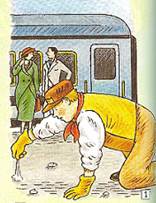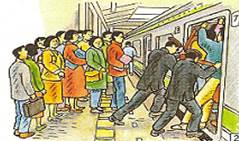Read and translate the text.
Odd jobs
 [A] Howmany jobs can you think of Twenty? Thirty? No doubt the list includes doctor, lawyer, teacher, mechanic, plumber, and so on. The most dedicated career adviser could perhaps name a hundred. But there are over 500,000 jobs in existence to choose from So, if you want to do well, how can you decide the best way to make a living? This week, Paul Hamilton takes a light-hearted look at some very ODD JOBS?
[A] Howmany jobs can you think of Twenty? Thirty? No doubt the list includes doctor, lawyer, teacher, mechanic, plumber, and so on. The most dedicated career adviser could perhaps name a hundred. But there are over 500,000 jobs in existence to choose from So, if you want to do well, how can you decide the best way to make a living? This week, Paul Hamilton takes a light-hearted look at some very ODD JOBS?
[B] King Alfonso XIII of Spain was going deaf so he employed an 'Anthem Man'. His only job was to give a signal to the king when the national anthem was being played so that he would know when to stand up and when to sit down!
[C] If you cannot find a tuneless monarch to be your employer, the railways offer jobs of all sorts. In Japan, 'Passenger Pushers' are employed full time by the railway companies in Tokyo. During the rush hour, when hundreds of people are trying to get on the metro, they do their best to squeeze everyone into trains so that the doors will close properly.
 [D] Another technological advance that led to job creation on the railways was the invention of chewing gum in 1928. When they finished their gum, many passengers just dropped it on the floor of the station and management at New York's Grand Central Station had to do something about it. In the end, they employed a professional gum remover who had a lot of work to do - he collected, on average, over three kilos of the sticky menace per day. I suppose you could say he got attached to his job!
[D] Another technological advance that led to job creation on the railways was the invention of chewing gum in 1928. When they finished their gum, many passengers just dropped it on the floor of the station and management at New York's Grand Central Station had to do something about it. In the end, they employed a professional gum remover who had a lot of work to do - he collected, on average, over three kilos of the sticky menace per day. I suppose you could say he got attached to his job!
 [E] Escalators have provided inspiration for other rewarding careers. When the first moving staircase was installed at Harrods Department Store in London in 1898, it made many people scared. Shop assistants were put at the top of the escalator with instructions to give brandy and smelling salts to customers! And in 1911 when Earls Court underground station installed its first escalators, many people were worried about their safety. London Transport had a great idea; they employed a man with a wooden leg, his job was to walk up and down the escalators all day to show passengers how safe they were.
[E] Escalators have provided inspiration for other rewarding careers. When the first moving staircase was installed at Harrods Department Store in London in 1898, it made many people scared. Shop assistants were put at the top of the escalator with instructions to give brandy and smelling salts to customers! And in 1911 when Earls Court underground station installed its first escalators, many people were worried about their safety. London Transport had a great idea; they employed a man with a wooden leg, his job was to walk up and down the escalators all day to show passengers how safe they were.
[F] In 1982, dozens of neighbours in a village in Berkshire made complaints about the smell from the nearby sewage works. So twelve people were employed to sniff the air outside their homes to estimate the smell. The Amsterdam polite have similarly specialised task force called the 'grachtenvissers'. Their sole duty is to help motorists whose cars have got stuck in canals! This trend towards specialisation has grown dramatically in the last few years but it is not an entirely recent phenomenon. In medieval Japanese armies, special soldiers did the gruesome job of counting up the number of decapitated heads after each battle!
[G] In America, Miss Edith King was given an unusual job in the army. She was employed by the US War Department in 1905 with the task of finding soldiers who had run away from the army. She collected $50 for each deserter. Her only weapon was flirtation. If the runaway soldiers thought they were going to have a good time, they were making a big mistake — she led over five hundred into court. .She must have had real charm!
[H] Being unemployed often makes people think of unique ways to make money. Take Jim Parker from Sacrament. Last year he got the sack from his job in a high-tech company and has found it impossible to get full-time work. In desperation, he became self-employed and is now trying hard to sell advertising space. If the price is right, he intends to tattoo an advert - on his forehead! He has already turned down an offer of $75,000.
(from New opportunities. Intermediate. Students Book. P. 94)